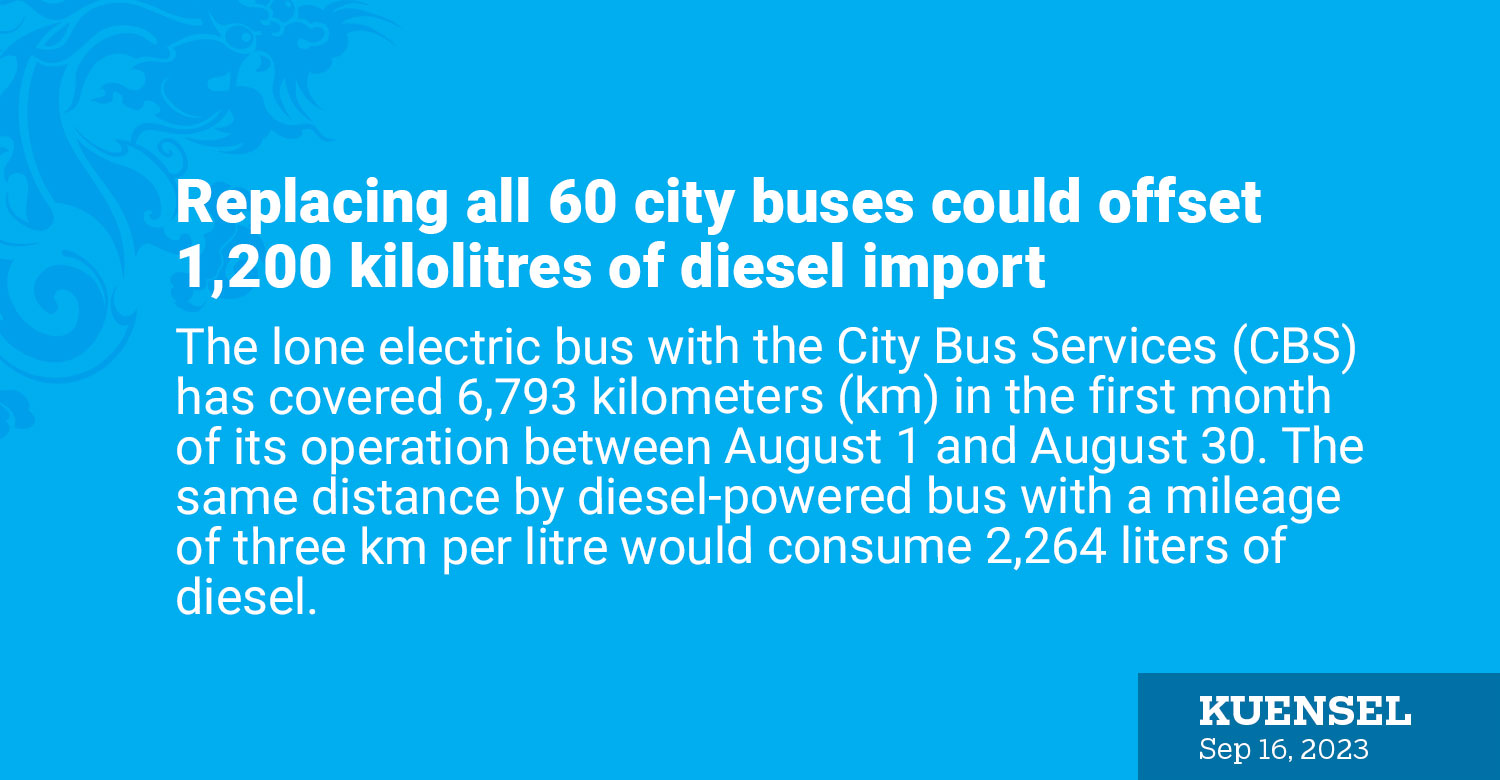Bhutan imported 106,000 kilolitres of diesel worth Nu 8.73 billion in 2022
Yangyel Lhaden
The lone electric bus with the City Bus Services (CBS) has covered 6,793 kilometers (km) in the first month of its operation between August 1 and August 30. The same distance by diesel-powered bus with a mileage of three km per litre would consume 2,264 liters of diesel.
In August, the electric bus saved Nu 185,715 from fuel calculated at an average price of diesel during that month at Nu 82.03. The cost of electricity to run the electric bus amounts to Nu 2,400 a a month. The bus is charged once for five hours every night and operates from 6:00 am until 12:30 am on a single charge.
Using the August data as a baseline, if the entire fleet of CBS—60 buses— is replaced with the same brand of electric bus, the entire electric fleet could save about 1,200 kilolitres of diesel imports annually.
Last year, the country imported 106,000 kilolitres of diesel worth Nu 8.73 billion.
Director of CBS, Pasang Tshering, said that they aim to convert the entire fleet of buses to electric. He is applying for international projects that support green energy. “Import of fuel is among the top 10 imports in the country, which has a significant impact on foreign reserves, and the operation of buses involves a substantial amount of diesel imports,” he added.
In the first quarter of this year, among the top 10 imports, the surge in import bills was primarily driven by an increase in fuel, which soared to Nu 3.3 billion from Nu 1.71 billion during the same period, according to figures from Department of Revenue and Customs
A city bus today burns 60 litres or Nu 5,000 worth of diesel every day. This translates to 3,540 litres of diesel or Nu 295,000 for all the 59 buses in a day. In a year, CBS spends at least 1.27million liters of diesel, worth about Nu 106 million for operating the city bus service.
However, on average, one bus generates a revenue of Nu 3,000 daily. Smart card users are charged a fare of Nu 5, with an additional Nu 1 for each bus stop they travel, while bus ticket holders pay a base fare of Nu 10, in addition to Nu 1 for every bus stop on their journey.
Pasang Tshering said that a substantial portion of the revenue earned is allocated to fuel expenses, and CBS continues to depend on government subsidies for its operation. “CBS was established as a social service with minimal fares, and our primary goal is not profit but to serve the public.” However, he said, to see immediate impact on revenue and carbon emission reduction, there needs to be more electric buses on road.
A liter of diesel emits 2.86 kilograms of carbon dioxide. The operation of the electric bus has reduced 6,068.40 kilograms of carbon dioxide emissions in its first month. Over the course of a year, this electric bus has the potential to reduce carbon dioxide emissions by a total of 72,820.85 kilograms.
If all 60 buses bare replaced by electric buses, the entire fleet could reduce carbon emission by about four million kilograms of carbon dioxide.
“In terms of the environment and CBS’s revenue generation for its operation, electric buses would be efficient based on our data from first month of its operation,” Passang Tshering said.
The electric bus worth Nu 14.85 million and three charging stations worth Nu 4.4 million was funded by Austrian Federal Ministry of Europe, Integration and Foreign Affairs to CBS for public transport.


